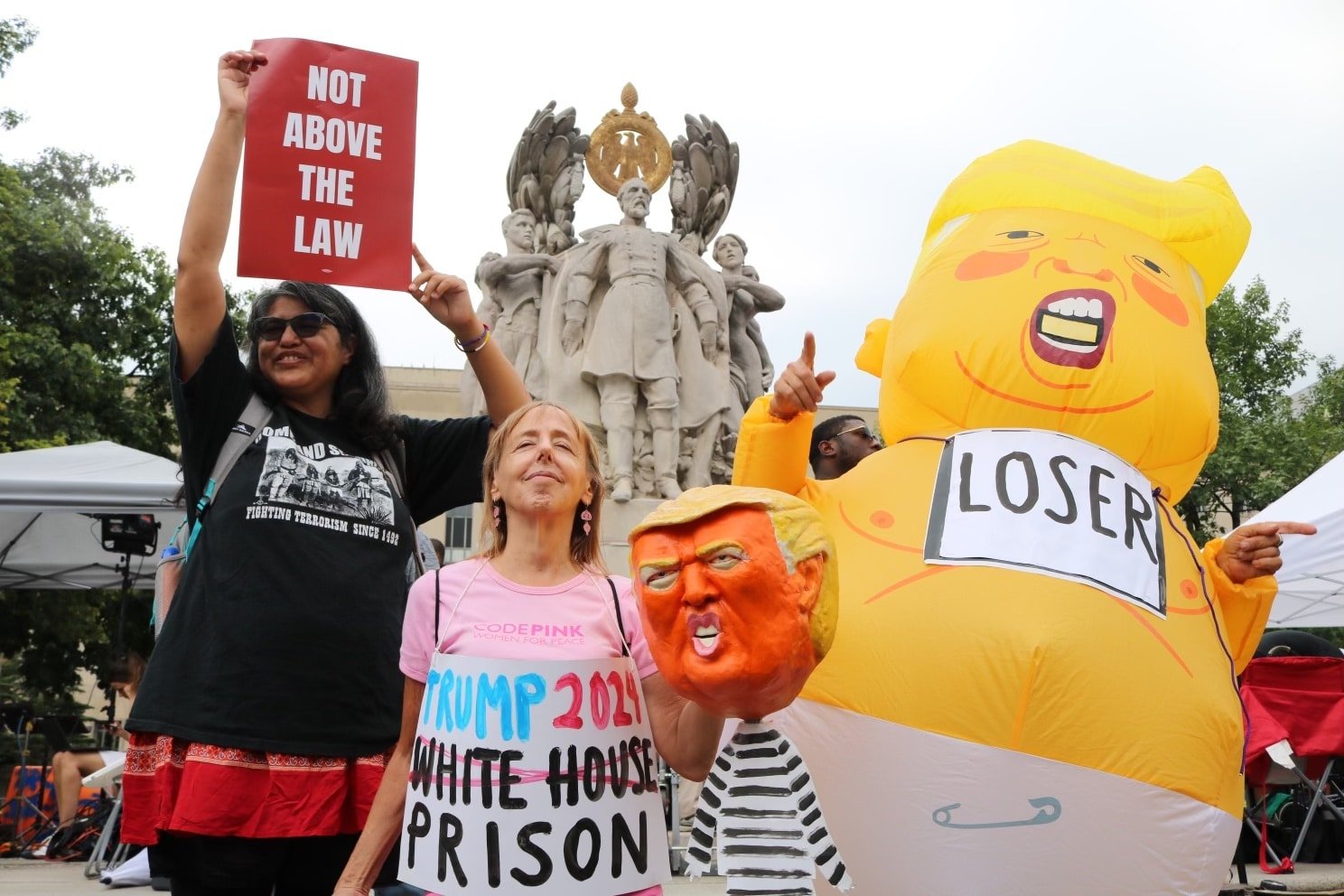WASHINGTON (CN) — Donald Tump must abide by strict rules as he handles the majority of the evidence against him in the criminal case over his alleged efforts to subvert the 2020 election, following a federal judge's protective order issued Friday.
U.S. District Judge Tanya Chutkan said she also wants to prevent Trump’s supporters from using the information to intimidate witnesses on his behalf.
The judge emphasized in a hearing Friday morning that such orders are common in criminal cases and that she had no intention of curtailing the presidential candidate’s First Amendment rights but must ensure Trump doesn't share evidence that could prejudice potential jurors or intimidate potential witnesses.
“Mr. Trump, like every American, has a right to free speech, but that right is not absolute,” the Barack Obama appointee said.
Special counsel Jack Smith and his team must designate specific materials as sensitive, the judge ruled, rather than opting for a “blanket order” marking all the evidence as such.
Chutkan also instituted strict guidelines for Trump while he reviews evidence, agreeing in part with the government that Trump should not be left alone with the documents where he could take photos and save personally identifying information about witnesses to be used for intimidation.
Trump will not be allowed to bring in any electronic devices during the review and his notes will be reviewed by his defense counsel.
Thomas Windom, an attorney on the special counsel's team, indicated the "vast majority" of the evidence collected is already considered sensitive, including some 11.6 million documents the government said it would share with the defense Friday.
Any non-sensitive material will be subject to fewer restrictions unless it contains witnesses' personally identifying information.
Chutkan’s decision comes after Smith’s team and Trump’s defense attorney John Lauro, of Lauro & Singer, submitted dueling proposals last weekend for the scope of the protective order.
During the hearing, Lauro expressed concern that the government’s proposal was a “contempt trap” that would punish Trump for any statements he may make on the campaign trail regarding witnesses who testified before the grand jury, which would include fellow presidential candidate and Trump’s former running mate, Mike Pence.
“We’re in unprecedented waters, where a defendant is running for office,” Lauro said. He also sought to characterize the case as a political prosecution benefiting President Joe Biden and his reelection campaign.
Chutkan pushed back on the defense’s assertion that this case would interfere with Trump’s campaign, saying the court proceedings took precedence over Trump’s “day job” on the campaign trail.
She also said if Trump continues to make ambiguously threatening statements — such as the Truth Social post the day after his arraignment last Thursday where he wrote “IF YOU GO AFTER ME, I’M COMING AFTER YOU!” — the “greater the need to move quickly to trial.”
Windom pointed to Trump's posts as well, and to interviews Lauro gave with CNN, ABC, NBC, CBS and FOX over the weekend, while arguing that with such a large bounty of evidence it was especially important to limit what the former president and his lawyers can share online and on television.
He pointed to these instances and the looser rules the defense proposed as evidence of Trump and his lawyers’ intent “to be able to try this case in the media,” and even taint the jury pool in Washington enough to warrant a venue change.
Trump and his lawyers have argued that they can't get a fair trial in Washington because of the district’s overwhelming support for Biden in the 2020 election: 92% of residents voted for Biden, only 5% voted for Trump.
The chances of Chutkan approving a venue change are slim considering the Sixth Amendment requires a trial take place in the “district wherein the crime shall have been committed,” which in this case would be the Capitol, just down the street from the federal courthouse in Washington.
Before concluding Friday’s hearing Chutkan also denied Trump’s bid to open up the authorization to view evidence to anyone assisting in the case, such as “volunteer attorneys” and consultants. The judge said the request would be too broad and could apply to anyone, joking that in Washington, nearly everyone can say they’re a consultant of some kind.
Smith requested that the trial begin early next year on Jan. 2, 2024. Appointed special counsel by Attorney General Merrick Garland, the special prosecutor operates independently of the Justice Department. He garnered an independent reputation as chief prosecutor in the International Criminal Court in The Hague and as an assistant U.S. attorney in the Eastern District of New York and in the Middle District of Tennessee.
While Trump has yet to respond with his own trial date request, it's likely he will seek to delay the proceeding until after the 2024 election, as he did in the Mar-a-Lago classified documents case.
The parties are scheduled to meet before Judge Chutkan again on Aug. 28 to discuss a trial date and a “small amount of classified information” that would be turned over to Trump.
Subscribe to Closing Arguments
Sign up for new weekly newsletter Closing Arguments to get the latest about ongoing trials, major litigation and hot cases and rulings in courthouses around the U.S. and the world.









